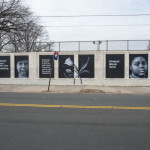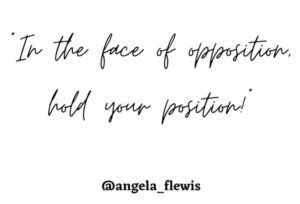Community Leader/Activist Aiysha Jaggassar Talks Politics, Pain and Perseverance


Artist Tatyana Fazlalizadeh creates a mural honoring community women in St. Albans, including Activist, Aiysha Jaggassar
“Just Let it go, and leave it in God’s hands,” are the lingering words of Community Leader Aiysha Jaggassar’s late husband, Officer Curtis Johnson. The words echo as a personal well of encouragement for the self-proclaimed over-thinker, who despite loss, challenge and change, manages to advocate for a community that often sees her strength, but rarely hear the story of a woman destined to lead.
The Beginning
“I grew up in Brownsville,” Jaggassar says, regarding her humble beginnings in one of Brooklyn, New York’s toughest inner-city communities. At the tender age of 13, Jaggassar’s first job was to serve as a youth counselor and camp director at a daycare center within the community, where statistically, many were not expected to live past their early 20’s (New York Department of Health and Mental Hygiene’s Bureau of Vital Statistics, 2019).
“As a child, I had a summer youth job and remember seeing the lack and not enough help. Seeing the need, made me want to help out more,” says Jaggassar.
“There was always a need where ever I worked, dealing with children. I would be planted and placed there and I would become consistent with understanding and meeting the need where ever I was planted,” she adds.
This consistency would become a staple of Jaggassar’s drive, as she explains how her early summer experiences developed a passion for education, teaching and organizing to positively impact youth and the most vulnerable in society.
“Working with children is being able to set a foundation for them. Especially when you don’t know what they are going through, and you give them that nurturing and understanding of patience and love in that early stage of life,” Jaggassar explains.
While reflecting on her early upbringing, Jaggassar discusses what made the difference in her life.
“Brownsville was a really tough, rough neighborhood. Teachers didn’t encourage too much and that was disappointing. When I went to school, if your grades didn’t hit a particular average and you weren’t in the high 90’s, you didn’t hear about college,” says Jaggassar.
She adds that exposure to explorative programs within the sciences and other preparatory programs were not available to much of the youth in her community. “I just happen to be fortunate, because my sister was in the high 90’s [average] and she was going off to college, so that was the big thing talked about in my household,” says Jaggassar.
She explains further that there was a family expectation for her to follow suit and a small, core group of friends.
“I had a couple of friends on the basketball team and their coach told them that they had to maintain a high average in order to play in the game. They were filling out college applications, and they were like, ‘if you want to hang with us, you got to do homework,” chuckles Jaggassar, “That’s how fortunate I was to be able to even hear about college.”
These experiences helped to mold Jaggassar’s perspective on the importance of having mentors, giving back to one’s former community and creating opportunities to expose people to experiences beyond walls of statistics.
With these values instilled at an early age, Jaggassar followed her passion and entered college to study education. While in college, a rare opportunity would ultimately expand Jaggassar’s life and trajectory of her career path.
An Opportunity of A Lifetime
“I was working with the Board of Education as a paraprofessional and working on my undergrad degree. I was like, ‘ I’m going to teach, this is good, hours are flexible and I’m almost close to graduation,” Jaggassar says.
With all things considered, Jaggassar had a plan and life was comfortable. With the expectation of graduating, Jaggassar added working part-time for Former State Senator Shirley Huntley, as a means to gain experience on the grassroots level of community outreach.
However, Former Senator Huntley envisioned a bigger plan for the passionate, Jaggassar.
“She said, ‘Listen, I want you to join my team,” Jaggassar recalls of receiving Former Senator Huntley’s invitation to work full-time for the state Senate. “She told me, ‘there is a lot of work that needs to be done in the community and we can definitely use you,” explains Jaggassar.
The life-shifting decision was planted at the feet of a young Jaggassar, who was gearing up to walk across the graduation stage.
“It was kind of crazy because my mind was on teaching,” says Jaggassar. However, the magnitude of the opportunity was one that Jaggassar was not willing to let pass. She decided to postpone her graduation, exchanging pomp-in-stance for politics.
Not shy about taking risks, the Brooklyn-born Jaggassar found the transition to be fitting and unexpectantly timely.
“I was able to use all my education knowledge and coursework. I was still working with children, helping at the colleges and helping upstate with the young people. I was still able to pour in and utilize my skill set,” says Jaggassar.
Jaggassar was able to serve, faithfully over the course of seven years as a constituent liaison, constituent /public affairs representative and state Senate representative. Having worked during the mortgage crisis that caused many of her constituents to go into foreclosure, Jaggassar team-planned seminars and financial workshops to provide resources and information to help save homes, advocate for improved school programs and parental involvement, aid in getting more minorities registered to vote and advocate against domestic violence.
With these successes, came many challenges. “I saw the lack of people getting involved, people ashamed to open their mouths to ask for help [such as during the mortgage crisis]. You didn’t see too many people getting involved in the schools and they were losing their schools. They were turning their school’s into multi-campus schools and these were certain challenges. I am like, ‘where are the people?,” Jaggassar explains.
Notwithstanding political challenge and in-house political setbacks during the latter years of Former Senator Huntley’s tenure, Jaggassar reflects passionately on remaining grateful to learn the details behind school policies, the financial aspect of policy development and community building, which she believes laid the framework for her current leadership work as a school director and Queens Community Board 12 member, where she seeks to be a voice for the people.
Jaggassar eventually completed her undergrad degree at Nyack College, never missing a beat with her ongoing community work and newfound political insights within her current Queens, NY community. This level of consistency would eventually lead to yet another opportunity. An opportunity for love.
The Meeting
It was after a busy few days of work, that Jaggassar found herself seeking a little refreshing at the local YMCA. That refreshing didn’t quite come from the pool, but who was monitoring the pool. Jaggassar found resolve in not getting her hair wet, so sitting poolside gave her a focused view of the attractive, lifeguard on duty that fateful day. Upon getting up to leave, the lifeguard on duty, suddenly asked Jaggassar when she would be coming back.
” I’m not trying to get my hair wet,” Jaggassar recalls saying to the lifeguard.
After some brief, flirtatious exchanges, Jaggassar exits the YMCA coyly with, “Alright, I’ll come back.”
“It went to one conversation, to hanging out, to going out, to dating and then we ended up getting married,” Jaggassar explains. “It was a whirlwind.”
She states that initially, she was unaware that the lifeguard, Curtis Johnson, was also training as a police officer.
“It was a phenomenal connection … We seemed to work hand in hand from the government to the police force,” says Jaggassar.
The public service aspects of both Jaggassar and her husband’s life, often made for interesting conversations at home and among her colleagues, shares Jaggassar. She recalls one officer humorously asking, “Did you marry one of our brothers? Wait a minute, I don’t have to take your complaint. You can just tell your husband now.”
Jaggassar describes four years of laughter, happiness, and love with Officer Johnson, a devoted husband that was even assigned to serve in her hometown of Brownsville at one point. Johnson, like Jaggassar, was also very consistent.
“Every night, he held out his hand towards me and said, ‘Come on, let’s go to bed,” Jaggassar shares.
Yet, there came a night, when his outstretched hand would no longer be there to guide her to sleep.
A Fateful Day
” It’s just like [it happened] yesterday. We were on the phone and we were talking about visiting his parents. Then, we were talking about dinner and he was like, ‘don’t cook no more salmon,” laughs Jaggassar, ‘Don’t fry it, Don’t shish Kabob it, don’t bake it. If you bring another piece of salmon up in this house, we are going to have a problem.”
Jaggassar remembers she and her husband laughing throughout the conversation, regarding his resistance to another piece of cooked salmon for dinner. Eventually, Johnson requested for his wife to bake some lamb.
“Alright, I’m going shopping to get you some lamb, not a problem, ” Jaggassar recalls, before wrapping up the call.
Shortly after, Jaggassar says her phone rang, and it was her husband’s police partner. While on the call, her phone continuously clicked. In between clicks, she heard her husband’s partner state, “Curtis was in an accident, you need to get to the hospital.”
He went on to instruct Jaggassar to drop the car home and the police would pick her up.
“I still was not thinking it was bad,” says Jaggassar, “Two of his partners picked me up and I’m still not thinking anything.”
While riding in the car, Jaggassar states she remained calm and realized later that the officers knew about the same amount of information that she received.
Upon entering the hospital, Jaggassar recalls someone coming out crying. Still, nothing dawned on her to think that the accident was major.
“They bring me in the room and I see a room full of officers. I see Curtis’ partner with his fiance, the detective sitting next to me and I’m like, ‘everything, ok?’ The detective says, ‘we are just waiting to hear from the doctor,” Jaggassar recalls.
“Doctor comes in and says, “We’ve done everything that we could and he didn’t make it,” says Jaggassar.
For Jaggassar, the next few moments of that day felt unreal. She recalls being in a state of shock with a mixture of emotions that refused to accept her husband’s death.
“It sounded like something off a tv. I refuse to believe this,” explains Jaggassar.
In disbelief at what she heard and pulling from her faith, she requested to see her husband. While still in a state of shock, Jaggassar recalls praying and telling her husband to wake up. It was a pivotal moment, whereas a friend came into the room to console Jaggassar and agreed to pray for God’s will, instead.
“When you think about God’s will, it has nothing to do with you. I will be honest, I didn’t want to hear that. I knew what that meant. I wanted to hear my will and for him to get up,” says Jaggassar.
By this time, senators and councilmen were entering the hospital, offering support as news teams arrived to gather information on a fallen police officer. It was maybe one of the few times, that the woman that served throughout her life, was needing the service of others to aid healing.
The Continous Journey
While trying to make sense of the tragedy, Jaggassar admits the painful journey towards healing and understanding the grieving process.
For Jaggassar, the greater need to disassociate from her pain and the reality of her husband’s death began to manifest in ways that affected the very areas that normally brought her peace and sense of purpose.
“I became emotionally triggered at community board meetings where I would see police officers and service people that worked with my husband. I began to develop anxiety and issues with public speaking,” says Jaggassar.
She later realized it was unacknowledged emotional trauma from her husband’s passing.
Rather than continue to ignore her pain, Jaggassar decided to meet it head-on after finding it a challenge to merely read community members’ names.
“I didn’t get a chance to grieve the way I needed to grieve. At the same time, I didn’t realize I was angry. I’m smiling and greeting everybody, but I’m angry and hearing all these wonderful testimonies,” she recalls.
Jaggassar states that she came to a point of simply wondering, ‘What about me and why didn’t God do it for me and keep my husband here?’ She felt ashamed for feeling that way and it was killing her inside.
“He [God] gave me that grieving moment and such a wonderful relationship with my family and church family that allowed me to grieve the way I wanted to grieve, without being judgemental,” says Jaggassar.
Finally, with the support of the people she loved and a vulnerability to find healing, Jaggassar remembers God dealing with her heart. She recalls personal moments with God that reminded her that there’s still work for her to do and that her late husband, Officer Curtis Johnson had indeed completed his race. Now, it was time for her to complete her own.
Power to Serve
“He’s such a loving God, He’s such a forgiving God,” Jaggassar says, while gaining the strength to turn all her unique experiences into power to serve and see life through the lens of our fragile human condition.
For Jaggassar, all paths lead back to the people. It was the people and their needs that propelled her life pursuits, and it is the people that continue to motivate her to persevere within the shadows of adversity and challenge. With a life that has been fueled by passion, persistence and even pain, Jaggassar’s human experiences have garnered genuine human connection, which is service in its most purest form.
–Written by Angela Fedrick-Lewis





